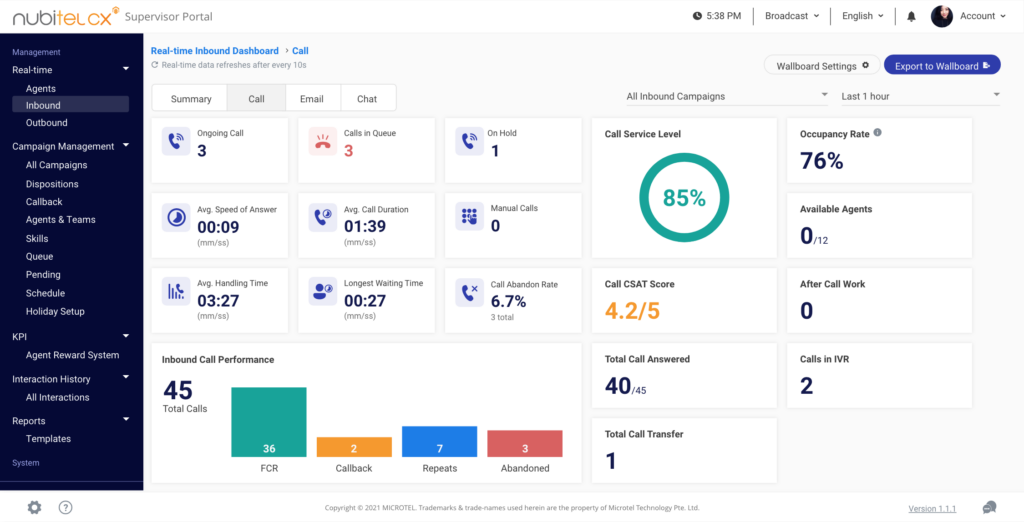Call center management is the backbone of delivering outstanding customer service. In today’s fast-paced world, where customers expect quick and personalized support, a well-run call center can be the difference between brand loyalty and lost business. The right strategies empower teams to handle inquiries efficiently, boost agent performance, and create seamless customer interactions.
In this guide, we will explore the importance of call center management, key responsibilities of managers, essential tools, best practices, and common challenges with their solutions.
Table of Contents
ToggleImportance of Call Center Management
As customer service expectations continue to evolve, businesses must adapt to meet these changing demands. According to a Deloitte report, companies that prioritize customer experience are 60% more profitable than those that do not.
Effective management directly impacts operational efficiency, helping reduce costs, enhance team performance, and improve overall service delivery. A well-managed call center is equipped to provide timely, personalized responses to customer inquiries, improving not just satisfaction but the brand’s reputation as well.
Key Responsibilities of Call Center Managers
Call center managers oversee all aspects of operations, from team leadership to customer satisfaction. Their responsibilities ensure that the call center runs smoothly and meets its KPIs. Three key areas where managers focus their efforts are team leadership, performance monitoring, and customer satisfaction.
Team Leadership
A call center manager is expected to lead by example, guiding and motivating their teams. Strong leadership is essential for maintaining morale and fostering a positive work environment. Effective leadership involves providing clear communication, offering guidance, and ensuring agents are well-trained and equipped with the skills to handle various customer interactions. Motivated agents tend to perform better, which directly impacts the quality of service provided to customers.
Managers should also build a team culture that promotes collaboration, transparency, and growth. By nurturing a supportive environment, agents feel valued and are less likely to experience burnout, leading to higher retention rates.
Performance Monitoring
Performance monitoring involves tracking the performance of call center agents to ensure targets and standards are met. Managers should regularly review key metrics, such as Average Handling Time (AHT), First Call Resolution (FCR), and customer satisfaction scores. Using advanced analytics tools, managers can pinpoint areas where agents may need additional training or support, allowing for data-driven decisions.
A robust performance monitoring system provides insights into operational efficiency, helping managers optimize workflows, identify bottlenecks, and improve customer service. The ability to address performance issues promptly ensures that agents maintain high service standards.
Customer Satisfaction Focus
Ensuring high customer satisfaction is a core responsibility in call center management. Managers must focus on resolving customer issues efficiently and effectively, as satisfied customers are more likely to remain loyal and recommend the business to others.
McKinsey research shows that companies implementing strong experience-led growth strategies that enhance customer satisfaction by at least 20% can achieve substantial financial gains. These include a 15 to 25% increase in cross-sell rates, a 5 to 10% boost in share of wallet, and a 20 to 30% improvement in overall customer satisfaction and engagement. By prioritizing customer experience, businesses can strengthen brand loyalty and drive long-term success.
Must-Have Technologies to Elevate Call Center Management
To keep a call center running smoothly, managers need access to the best tools and technologies. From CRM software to call analytics tools, having the right systems in place ensures agents can handle customer interactions effectively and efficiently.
CRM Software
A robust CRM system with case management capabilities is essential for handling customer interactions efficiently. It centralizes customer data, tracks engagement history, and enables personalized support, helping agents to resolve inquiries faster. Solutions that integrate directly with CRM connectors ensure seamless data synchronization to improve workflow efficiency and enhance the overall customer experience.
Call Analytics Tools
Understanding customer interactions is the key to optimizing call center performance. Advanced analytics tools offer real-time reports and dashboards that provide insights into agent availability, call handling times, service levels, and customer satisfaction scores.
These insights allow managers to refine strategies and improve service delivery. By leveraging these tools, businesses can efficiently track KPIs, identify trends, and enhance overall operational efficiency.

Best Practices in Call Center Management
Effective call center management is not just about tracking metrics; it’s about fostering a culture of excellence. Implementing best practices ensures high service standards and continuous improvement.
Employee Training and Development
Investing in training and development is one of the great ways to reach the success of a call center. Managers should provide ongoing training to ensure agents stay up-to-date on product knowledge, communication skills, and customer service techniques. Additionally, offering career development opportunities can improve job satisfaction and reduce turnover.
Regular coaching and skill-building sessions help agents refine their approach and improve overall service quality. A well-trained team is equipped to handle challenging situations, improving customer satisfaction and performance.
Efficient Scheduling
Efficient scheduling ensures that the right number of agents are available to handle peak demand times without overstaffing during slower periods. Call center managers should utilize workforce management software to forecast call volumes, schedule agents accordingly, and ensure operational efficiency. Proper scheduling reduces agent burnout, enhances performance, and ensures customer queries are handled promptly.
Embracing Technology
The adoption of new technologies can dramatically enhance the efficiency of call centers. From AI chatbots to advanced call routing systems, embracing technology enables managers to streamline operations and provide faster, more personalized service.
Automated systems can handle routine inquiries, allowing agents to focus on more complex issues, while AI-powered tools assist with data analytics and performance tracking.
Challenges in Call Center Management and Solutions
Managing a call center comes with challenges that can impact performance and customer satisfaction. This table covers key obstacles and solutions to overcome them.
| Challenge | Solution |
|---|---|
| High Agent Turnover | Implement employee engagement programs, offer career development opportunities, and introduce performance incentives to improve retention. |
| Meeting Omnichannel Expectations | Integrate omnichannel platforms for seamless communication, ensuring agents have access to customer data across all touchpoints. |
| Balancing Cost Efficiency & Service Quality | Use AI-driven tools to optimize staffing, introduce self-service options, and implement analytics to reduce operational costs while maintaining service quality. |
| Maintaining Consistent Customer Experience | Implement AI and automation for accurate issue resolution, reduce agent burnout by balancing workloads, and introduce real-time quality monitoring. |
| Data Security & Compliance Challenges | Employ advanced encryption, regular audits, and compliance checks (GDPR, PDPA) to ensure data security and meet regulatory requirements. |
Building a Scalable and Future-Ready Call Center Management
As the call center landscape evolves, businesses must stay ahead by continuously improving management strategies, adopting new technologies, and refining agent performance. Investing in leadership development, real-time analytics, and AI-driven automation will be crucial for long-term success.
Nubitel’s cloud-based contact center solutions provide businesses with the technology needed to optimize call center performance. From AI-powered analytics to omnichannel customer engagement tools, Nubitel helps call centers streamline operations while delivering personalized and efficient customer interactions. By embracing the right strategies and technology, companies can future-proof their call centers and maintain a competitive edge in customer service.





